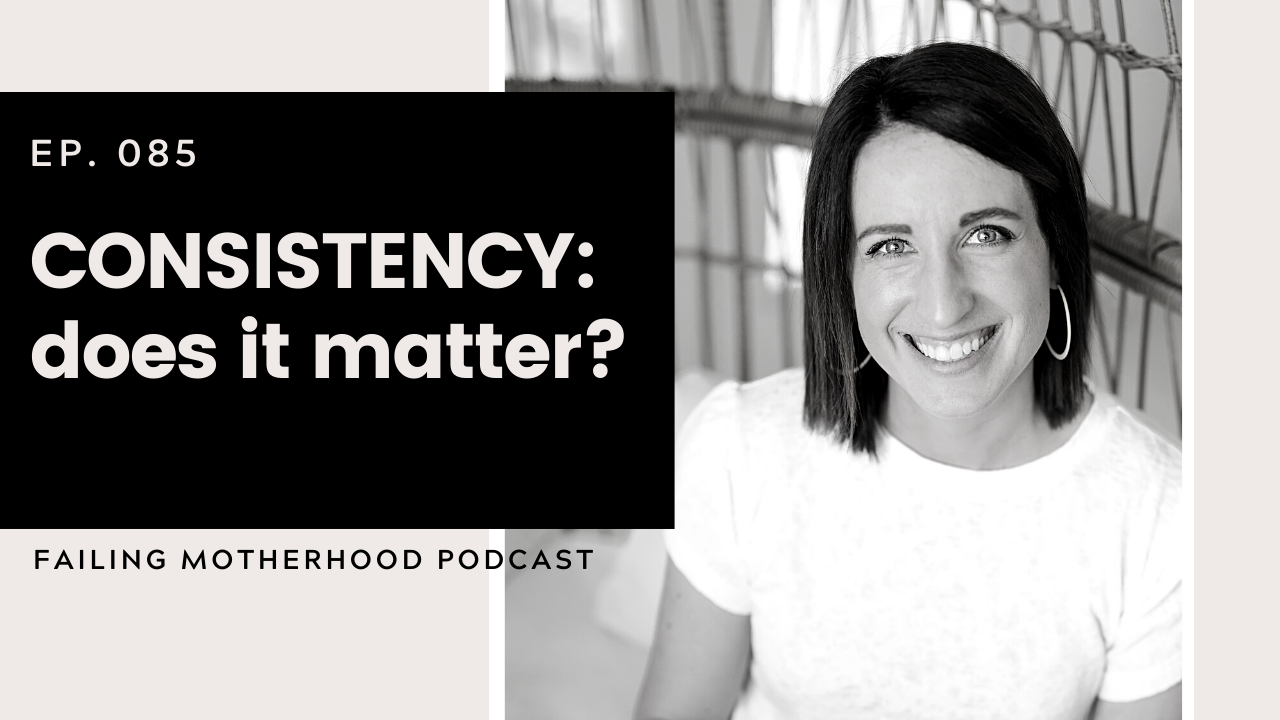Will their behavior get better over time if I stay consistent?
Jan 10, 2023
A big belief worrying warriors have is...
We just need to be consistent.
Their behavior will get better over time.
It's understandable that they believe this as well because surely that's how learning works, right?
They know they sometimes go back on their word - "no snacks after dinner bc you didn't eat your food" - - - "okay, you can have a snack..." Mom says no screen time and dad gets home and turns it on...
So of course THIS must be the reason for all the behavior they're still seeing.
As they get more mature, surely they'll stop doing what gets negative responses and keep doing more of the positive if the response is the same every time, right?
If consistency was all it took to raise good humans, it feels like the equation wouldn't be too difficult to execute!
It sure would be lovely if that's all it took!
I want to help you understand why consistency does matter, but not for the reasons you may think.
When consistency does matter -
I 100% support parenting partners working to get on the same page for their own sanity + relationship, as well as creating a healthy sense of predictability for their kids as they reiterate the same expectations day-to-day. Otherwise, it's confusing AF!
Like, when you pick them up from daycare, and they don't want to leave - some days you have to leave right away and some days you let them stay and play for 10 more minutes. That inconsistency can compound your inability to be kind and firm because it's like a lottery system. It inadvertently invites pushback because sometimes it works!
When they ask questions repeatedly, over and over - they ask because they want clarity - an answer. When we don't give it - or it's too vague, that invites more repetition, whining, and groundhog day - asking the same question over and over.
Consistency also matters a lot when it comes to your relationship - what your child comes to expect from your relationship- how safe they feel with you - how you handle them in good moments and bad. If they do the exact same behavior - whining about a sibling not giving them something.... but you react differently on Monday at 8 pm vs. Saturday at 10 AM.... that reveals how much is going on for you and not them in those moments - can cause them to feel like they don't know which parent they're going to get - a patient one or an irritated one?
And we're human, perfection is never the goal, but recognizing a pattern of inconsistency is an important step to working on it.
When doesn't consistency matter?
The belief that your child's behavior will get better over time with consistency.... let's decide together if that's true.
If consistency was all it took to change behavior, surely they wouldn't continue to pushback on things that have been consistent since Day 1, like not playing in the dog bowl, not hitting, not forgetting that we get dressed first thing every morning.... but they do, at least my kids do, do yours?
We all knew a few kids growing up who notoriously had 'strict' parents - that child knew exactly what their parents were going to say about something before they ever asked.
Did that benefit them?
Or did it in fact invite rebellion due to a created divide of lack of understanding in their relationship?
I'm going to bring it up again, that book I said not to read last week - 1,2,3 Magic ... counting to 3 at every sign of perceived disobedience, disrespect, or emotion - deciding it's all ploys at manipulation.
It may feel *easy to implement* and *work* to stop the behavior in the moment - if it seems too good to be true, it likely is.
It's projecting - it's actually manipulation.
Ignoring teaches your child to ignore you if they don't like what you're doing down the road.
If it feels wrong to stay consistent when they're clinging to you and you want to stay with them until they fall asleep - it is wrong not to listen to that voice!
And in all actuality, without a child being modeled and taught the skills they need, their behavior doesn't improve over time- it becomes internalized.
They realize it's not safe to go to their parents - they can't handle me and my problems and my emotions.
It evolves into anxiety, mental health problems, lack of motivation at school, inability to cope with change + stress...
Behavior is communication.
Letting that message go unheard and untreated is like putting a bandaid on an infection.
It might look better but it's going to get worse.
You're missing a vital point of early intervention for skill building and influence.
First, you teach, then you counsel, then you coach. You have much more influence now than you will in 10 years.
Life isn't a river they just float down and pick it all up as they go.
It's an immense responsibility to raise a well-adjusted human!
Not to mention that it's downright impossible to be consistent 100% of the time. Even if that premise was airtight, you're physically unable to follow through.
Do you respond the same exact way every time your partner asks you for a favor? No! You're human! You have waning capacity, other tasks on your plate.
It depends! Your response to your child should DEPEND. You're a human raising a human.
Your responses should be as informed and intentional as possible, not a blanket formula of A + B = C.
Your child deserves to be understood, taught the skills they need to succeed, especially in the most powerful way - your modeling, and have your responses led with composure, patience, and thoughtfulness.
It's equally empowering for you to actually UNDERSTAND their behavior and know what to do to help rather than feeling at the mercy of a system that's out of your hands to respond.
So if you've been crossing your fingers for a couple of years now hoping that with consistency, your child's behavior will improve... and you're not seeing the outcome you're looking for....
If you're still dealing with power struggles and lots of big emotional meltdowns, borderline fits of rage... and your child is no longer one and a half and can't talk but they are three and they are four....
And they are almost in kindergarten or they're five. And they're holding it in together at school and then letting it all out on you. You need more support, you need more understanding and perspective and you need more tools, so that you just have this whole arsenal to pull from. And it becomes a lot more versatile and diverse and fully faceted and comprehensive of an approach rather than something that is just lacking in a lot of ways...
Watch the FREE Training - How to Parent Your Strong-Willed Child without Giving In or Dimming Their Spark so You Can Finally Break Free of Power Struggles + Self-Doubt
and then APPLY to work with me - www.parentingwholeheartedly.com/apply
Cheering you on!



